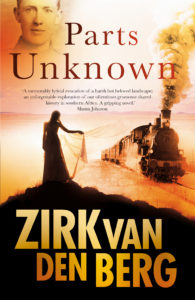
A memorably lyrical evocation of a harsh but beloved landscape; an unforgettable exploration of our oftentimes gruesome shared history in southern Africa. A gripping book. – Shaun Johnson
A love letter to a brutal landscape, and the tale of one man’s defiance of inhumanity. – Harry Kalmer
brilliantly traces the vicissitudes of blacks and whites enmeshed and ensnared in a tragic horror quagmire […] compelling, if unsettling reading […] humans and landscape merge in myopic mirages which enthral and entrap, so dedicated and clear are the author’s skills. – Peter Simmonds, Cape Argus
He was twenty-four years old and had come close to dying every winter of his life. It set him apart from others who did not recognise their own vulnerability. His tunic was a size or two too big around the chest, but the yearning in his heart was bigger still. He was going to Africa.
The character in the opening paragraph is Siegfried Bock, a soldier who came to Africa to prove his mettle. But soon he becomes disillusioned when he witnesses atrocities he cannot forget.
It’s German South-West Africa, 1905 – a time of war and upheaval.
Siegfried’s fate becomes intertwined with those of a couple of other people:
Lisbeth Löwenstein is here to marry a man she hardly remembers, a settler who has sent money to her impoverished parents in exchange for her hand in marriage.
Mordegai Guruseb escapes from a concentration camp where people are dying from deprivation. But before long his freedom is threatened once again.
And then there is the failed doctor Albert Pitzer who considers himself a scientist and hopes to gather data that prove his theories. However, Alvaus Luipert, a local schoolmaster, will not stand for his arrogant assumptions and demeaning methods.
Read the review in the Cape Argus.